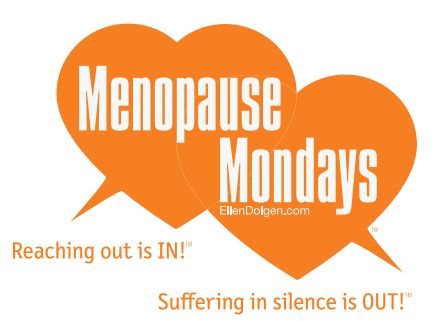
Sometimes, in menopause, hormones aren't the problem at all. Sometimes, the real issue is the role we play in our own lives and families--and for increasingly more perimenopausal and menopausal women, that role is sandwiched between two slices of responsibility.
More than 65 million Americans are family caregivers, according to the nation's leading non-profit for caregivers, Caregiver Action Network, which is celebrating National Family Caregivers Month in November. What's more, many of these caregivers are members of the aptly named "Sandwich Generation," a group marked by its responsibility to somehow care for both its children and parents. Get this: Currently about one in seven middle-aged adults provide financial support and four-in-ten provide emotional support to both their children and aging parents, according to the Pew Research Center. Seriously!?! As if being a mother wasn't difficult enough?

Years ago, widowed, single mother Katie Hafner found herself in that very situation, living with both her teenage daughter and elderly mother. Surprise, surprise! Drama ensued. But the pedestrian squabbles over who got what drawer were trumped by the fact that, prior to her mother moving in, the two women barely knew each other. They hadn't lived together since Katie was 10 years old and had been taken away because of her mother's alcoholism.
Katie had anticipated living together again as an opportunity to grow closer to her mother, but she came to learn it also was an opportunity to face the anger and resentment toward her mother she had unknowingly carried with her since childhood. Spoiler alert: the little "experiment," as Katie calls it, crashed and burned.
Writing became her therapy. Now, her memoir and an Oprah book of the week, Mother Daughter Me, casts a humorous, emotional, and, ultimately, uplifting look at how women can care for their mothers, daughters, and, most importantly, themselves.
So, whatever your caregiving role, take a lesson from Katie's experience. Here, her top three tips for taking care of yourself--even if you're living between two buns:
1. Forgive
No parent is perfect. Many women feel their parents "missed the mark" in one way or another. The key is finding a way to forgive those faults, not just for your parents' sake, but for your own sanity as well. "Writing Mother Daughter Me was very helpful in coming to terms with my mother's shortcomings as a parent. It was only in the writing of the book that I took the time and energy to understand who my mother really is, and the kind of parent she was, as well as the effect that alcohol had on her ability to parent us," Katie says. "I believe she loved her children, but once alcohol entered the mix, we didn't stand much of a chance--and neither did she! I feel very strongly that parents do the best they can, given what they have to work with."
2. Set Boundaries
"I spent a lifetime not knowing where those boundaries were because I was so busy nurturing an unrealistic picture of the life I thought I might have with her--and thought I should have had with her," Katie says. But after her "experiment in multi-generational living" failed, she found that, with boundaries, she and her mother were able to become closer than ever. "I learned to hold back, and hold onto myself, rather than confide in my mother endlessly (bad idea). We found that we could have great conversations without having to touch on topics that were too painful. But first, my resentment about my childhood needed to melt away, and I'm happy to say it has," she says.
3. Be Proactive
The goal of caregiving is to head off problems before they arise--and that goes both for your loved ones and for yourself. "Make sure there is a good system in place, and with good communication," Katie says. Sit down as a family to talk about everyone's priorities, come up with a plan, and cross the T's and dot the I's on medical and legal paperwork to ease stress later on. "Also, don't wait too long to make sure your parents have downsized, and started the step toward a retirement community. I have so many friends who say their parents waited too long. My own mother was very smart in that she moved out of her large house before she was too frail to control the move herself." Get more practical tips for reducing the emotional and financial burden of caring for aging parents.
This National Family Caretakers Month, let's join together and support all of the caretakers in our lives. Maybe it's a friend who has opened her home to her father. Maybe it's a sister who is coping will an ill child. Maybe it's you. As women, we are the rocks of our families. But before we can really take care of anyone else, we have to take care of ourselves.
Remember: Reaching out is IN! Suffering in silence in OUT!
For more by Ellen Dolgen, click here.
For more on women's health, click here.
Ellen Dolgen is an outspoken women's health and wellness advocate, menopause awareness expert, author, and speaker.
After struggling through the silence that surrounds menopause, Ellen resolved to help women reach out and end the confusion, embarrassment, and less-than-lovely symptoms that come with "the change." Her passion to be a "sister" to all women fueled Ellen's book, Shmirshky: the pursuit of hormone happiness. As a result of her women's wellness journey, and in response to the overwhelming thirst of her ever-expanding audience for empowering information, Ellen's weekly blog, Menopause Mondays was born.
Menopause Mondays allows Ellen an expansive platform from which she broadens her discussion of menopause, women's health, and life as a menopausal (and fabulous!) woman. Her weekly Menopause News Flash provides a one-stop shop for the latest menopause and women's health news and research, allowing women the access and know-how needed to take charge of their health and happiness. In addition to Ellen's ever-growing social media presence, EllenDolgen.com has fast become "the place" on the web for informative and entertaining women's menopause and wellness engagement. Ellen is #1 on Dr. Oz Sharecare.com Top 10 Social HealthMakers on Menopause. In 2012 and 2013 EllenDolgen.com was named first on the list of the "Best Menopause Blogs" by Healthline. Ellen is also a regular contributor to over a dozen leading women's health blogs. Her motto is: Reaching out is IN! Suffering in silence is OUT!
Ellen has appeared on the "TODAY Show," "NBC Nightly News", the "Rachael Ray Show," "The Doctors," Oprah Radio, Playboy Radio, NPR's "Tell Me More," Doctor Radio, and dozens of regional and national media outlets. In 2011 she appeared in a sold-out, San Diego production of "The Vagina Monologues." Ellen was one of the first regular contributors to debut on The Huffington Post's, Huff/Post50, which targets 116 million Americans over the age of 50.
Like Ellen Dolgen on Facebook, follow her on Twitter and Pinterest, connect with her on LinkedIn, Google+, and Klout, watch her videos on YouTube, and subscribe to her newsletter.
Earlier on Huff/Post50:
